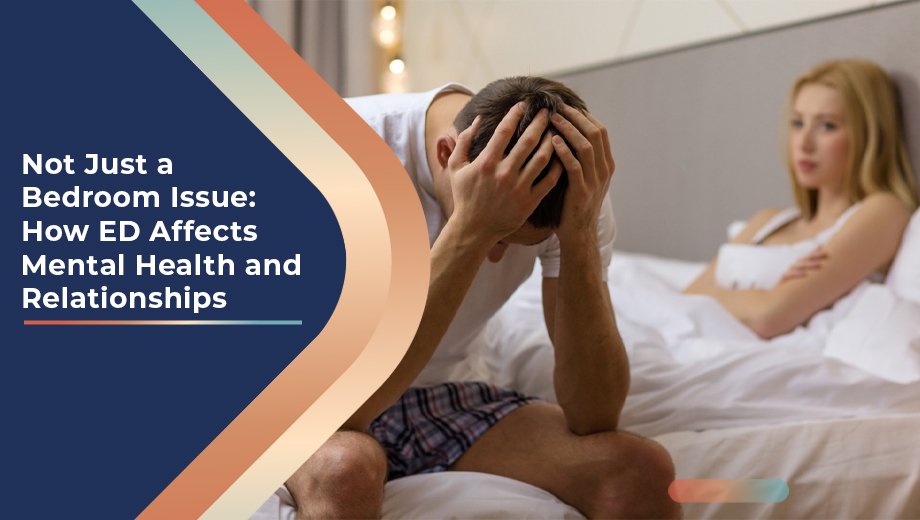Not Just a Bedroom Issue: How ED Affects Mental Health and Relationships

When people hear “erectile dysfunction,” the conversation often stays confined to the bedroom. But for millions of men, ED is far more than a physical problem—it has deep and lasting effects on emotional well-being, confidence, and intimate relationships.
Understanding how ED extends beyond performance issues is key to breaking the stigma, encouraging open dialogue, and helping men reclaim both their health and happiness. In this blog, we explore how erectile dysfunction impacts mental health and relationships, and what can be done to address the full picture.
The Psychological Toll of ED
Erectile dysfunction doesn’t just impact the body—it weighs heavily on the mind. For many men, ED can trigger a devastating blow to self-esteem. The inability to perform sexually can lead to feelings of inadequacy, embarrassment, and even shame.
Over time, this emotional burden may evolve into chronic anxiety or depression, especially if left unaddressed. The fear of “failing” again often creates a vicious cycle—performance anxiety kicks in, which makes it even harder to achieve or maintain an erection. This loop can become emotionally exhausting, affecting a man’s self-worth in and out of the bedroom.
Impact on Romantic Relationships
Erectile dysfunction is rarely a solo struggle—it deeply affects the dynamics of romantic relationships. ED can create emotional distance, especially if neither partner knows how to talk about it.
Partners may misinterpret ED as a lack of attraction or love, leading to confusion, frustration, or hurt feelings. The man experiencing ED may pull away to avoid embarrassment, while their partner may feel unwanted or rejected. Without open communication, these feelings often escalate into resentment, reduced intimacy, and ultimately, a breakdown in trust.
Even long-term relationships can suffer when ED enters the picture if both parties aren’t actively working to understand and support one another through the experience.
The Silent Struggle: Why Men Don’t Talk About ED
Despite how common ED is (affecting an estimated 30 million men in the U.S. alone), many suffer in silence. Cultural expectations around masculinity often pressure men to be “always ready” and strong, making vulnerability about sexual health taboo.
Men may feel embarrassed, ashamed, or fear being seen as “less of a man” if they admit to ED. This silence can delay treatment and worsen the emotional toll. When ED is kept secret, it fosters isolation and increases mental health risks—a burden that could be greatly reduced with open discussion and early intervention.
How Partners Are Affected Too
It’s not just the man dealing with ED who suffers—their partners often experience emotional consequences as well. A partner may feel:
• Insecure or unattractive,
• Confused about the cause,
• Guilty, thinking they are to blame,
• Rejected or emotionally disconnected.
In many cases, the partner doesn’t even know what’s going on, especially if ED is kept hidden out of shame. The lack of communication only fuels more misunderstandings and creates a wedge in the relationship.
Open and empathetic conversation is crucial. When couples talk honestly about what they’re experiencing, it becomes easier to move forward as a team instead of letting ED tear the relationship apart.
Seeking Help: A Crucial Step Forward
One of the most empowering things a man can do is seek professional help. ED is a medical condition, not a moral failing or sign of weakness. A urologist or primary care physician can help identify the cause, whether it’s physical (e.g., diabetes, hypertension), psychological (e.g., stress, anxiety), or a mix of both.
For many men, therapy is an equally important part of treatment. Cognitive-behavioral therapy (CBT) can help address anxiety and negative thought patterns around sex, while sex therapy can rebuild confidence and improve intimacy with a partner.
Support groups and online communities can also provide comfort, allowing men to share their stories, learn from others, and realize they’re not alone.
Importantly, treatment shouldn’t just focus on medication like Viagra or Vilitra—it should also include emotional and relational healing.
Rebuilding Confidence and Connection
Recovering from ED, emotionally and physically, involves more than just a pill. It’s about rebuilding self-confidence, emotional intimacy, and trust—both with yourself and your partner.
Here are a few strategies that help:
Focus on Mental Wellness
Practice mindfulness and stress-reduction techniques.
Address underlying depression or anxiety with a therapist. Improve sleep, diet, and exercise for overall wellness.
Talk Openly with Your Partner
Be honest about what you’re experiencing.
Encourage a judgment-free space to express fears and needs.
Explore non-sexual intimacy (touch, closeness, communication) to stay emotionally connected.
Use ED Medication Wisely
• Medications like Vilitra, Viagra, and Cialis can help restore function.
• Use under medical supervision to avoid side effects or drug interactions.
• View them as a tool, not a cure-all—they work best alongside emotional and psychological support.
Work Together as a Couple
• Attend therapy sessions together.
• Reignite intimacy without pressure to perform.
• Celebrate small progress steps to rebuild confidence.
Conclusion
Erectile dysfunction is not just a physical health concern—it’s a mental and emotional health issue that ripples into relationships, identity, and quality of life. The effects can be profound, but they are also treatable.
By breaking the silence, seeking help, and involving your partner in the journey, ED becomes a challenge you can overcome, not hide from. With the right approach—medical, emotional, and relational—men can regain not only their sexual health, but also their confidence, connection, and peace of mind.
If you or your partner are struggling with ED, know that you’re not alone—and help is available. It’s time to treat ED as the full-picture issue it is and give it the compassionate, comprehensive attention it deserves.
